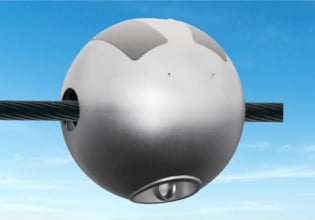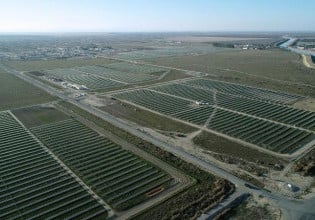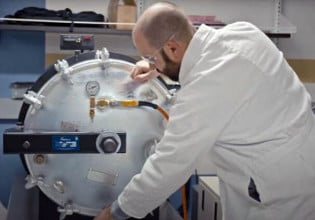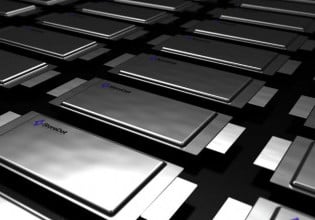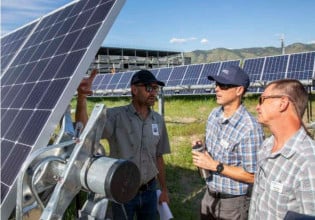Aluminum Sealed Film Capacitors for Harsh Humid Environments
This article introduces FTCAP's newly developed aluminum sealed film capacitors that are perfectly suited for use in offshore wind-energy conversion systems.
FTCAP has developed new aluminum sealed film capacitors that are perfectly suited for use in offshore wind-energy conversion systems. The capacitors are equipped with a special encapsulation and an aluminum deck and perform with a longer life under harsh humid conditions. Long-term tests confirm with use of the innovative capacitors sealing show a ten times less water adsorption rate than with a conventional sealing.
The Challenge of Harsh Environmental Conditions
DC link foil capacitors in industrial power electronics equipment are increasingly exposed to harsh environmental conditions. Especially in offshore wind-energy conversion systems, converters are exposed to conditions like moisture, salty air, and extreme temperatures. These conditions cause additional stress to the DC link capacitors that are used: Moisture severely affects the electrical properties of metalized foil capacitors. The moisture exposure leads to a resulting corrosion of the vacuum metallization. Other disadvantages are an increased loss factor, lower insulation resistance, and a higher thermal load. According to studies, the average humidity at the locations of wind-energy conversion systems is between 70% and 95%. With the use of standard capacitors, such conditions quickly lead to damage from corrosion, which significantly shortens the life cycle—sooner or later the result will be complete failure.
Special Aluminum Encapsulation for Optimal Seal
To solve this problem, FTCAP has developed type GP film capacitors. Standard GT type capacitors have a housing made of polyamide PA66, the film capacitor winding is simply potted with capacitor resin. Capacitors with improved moisture-proof properties (type GP) on the other hand have an aluminum deck and sealing ring. The special encapsulation of these capacitors provides excellent protection against moisture. The axial design additionally provides anti-vibration protection in order to minimize stress from torque at the sensitive terminal winding interconnection.
Figure 1. FTCAP has developed moisture-proof capacitors with a special encapsulation that are ideal for use in offshore wind-energy conversion systems.
Endurance Tests Passed
An endurance test lasting 26 days confirmed the effectiveness of the moisture-proof design: Eight foil capacitors of type GT (225µF/1000 V) with Steiner metallization foil were potted in a PA6 container with Wevo PU resin (capacitor type A). Another eight foil capacitors of type GP (225µF/1000 V) with Steiner metallization foil were potted with Wevo PU resin in an aluminum container and sealed with an aluminum cover (capacitor type B).
All 16 samples were stored for 26 days in a climatic chamber of type Weiss WKL 100_40 at 93% relative humidity and a temperature of 70 °C. Before and after the treatment the weight (core balance) and capacities (WayneKerr4300_EMP) of the A and B types were measured.
The result: no significant changes in capacity for the two capacitor models after the 26-day treatment. No drop in capacity was noted, as in the case of other tests. A 26-day treatment is probably too short to observe damage to the metallization of the electrodes. FTCAP, therefore, continues to test the aging process. However, a significant positive change in the weight of the two capacitor types can be observed. That is interesting because a positive change in weight under these circumstances is ascribed to the entry of water. The analysis of the weight gain of the capacitors shows that capacitors of type A have an average weight of 3 g after the test period, while type B capacitors weigh only 0.3 g. Although both models increased in weight, the increase for the standard version was ten times more than that of the new solution. The special encapsulation of the capacitors therefore effectively reduces the penetration of moisture, which results in a longer life and improved reliability, even under extreme conditions of use.
Additional Capacitors for Wind Power
In addition to the new moisture-proof film capacitors, FTCAP also offers numerous other solutions that are suitable for use in wind-energy conversion systems. For example, the long life electrolytic capacitor banks: in these solutions, several capacitors are connected on a single bus bar. The closed system makes it practically impossible for moisture to penetrate, which significantly extends the service life even in harsh conditions, such as offshore. Users of the electrolytic capacitor banks also benefit from a variety of additional advantages: The pre-assembled modules have an extremely low inductance and provide long fife time endurance due to the low height tolerances of the used single capacitors.
Figure 2. Capacitors used in wind-energy conversion systems are exposed to adverse conditions such as moisture, salty air, and extreme temperatures.
Figure 3. FTCAP offers a series of additional solutions that are suitable for use in wind-energy conversion systems – such as time-proven electrolytic capacitor banks.
With slight modifications, high-performance PowerStacks developed by FTCAP in cooperation with Mersen and AgileSwitch could also be used in wind-energy converters. These systems combine power modules, bus bars, capacitors, cooling devices and gate drivers in a single unit with high power density. For example, a model for energy storage was developed that can easily be adapted for the use in custom applications due to the versatile overall concept. In general, development is an ongoing process at FTCAP: Within the framework of the “Innovation Cluster Power Electronics for Renewable Energy”, the Husum-based company is also currently researching film capacitors with a high-temperature dielectric for an extended life cycle.
Figure 4. The high-performance PowerStacks developed by FTCAP in cooperation with partners Mersen and AgileSwitch could also be used in wind-energy conversion systems.
About the Author
Thomas Ebel holds a Ph.D. in Physical and Inorganic Chemistry at Westfälische Wilhelms-Universität Münster. He has a wide range of experience in professional research, managing, and leadership. He worked at FTCAP as the Excecutive Director and is now an Associate Professor at the University of Southern Denmark.
This article originally appeared in the Bodo’s Power Systems magazine.






